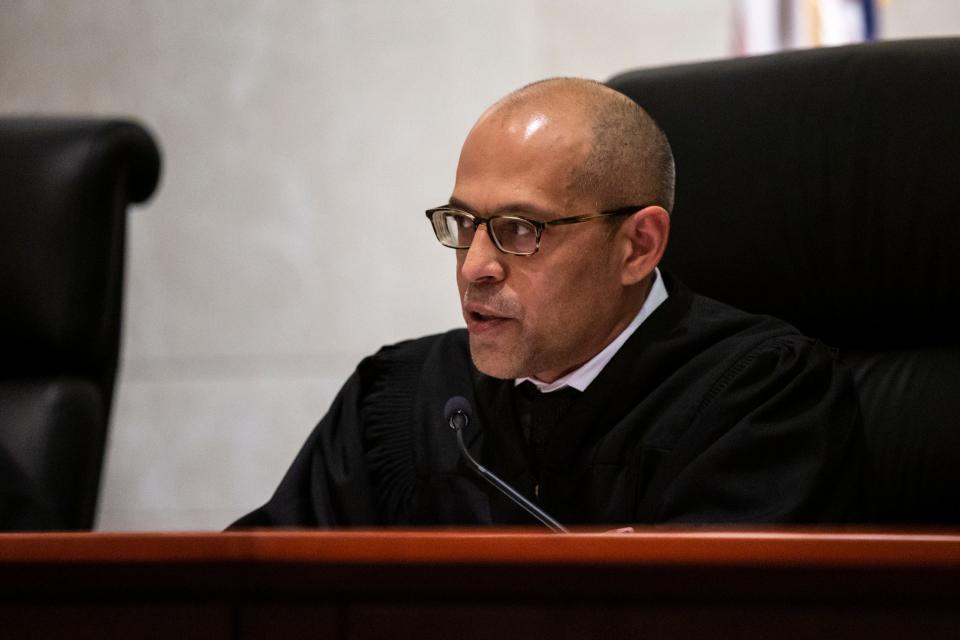Revenge porn defendant doesn't need to register as sex offender, Iowa Supreme Court says
A Boone County man who posted an explicit video of an ex-girlfriend online does not need to register as a sex offender, the Iowa Supreme Court says.
Friday's decision came in the case of Kadin Miller, who according to court filings recorded a sexual encounter with his then-romantic partner. After the relationship ended "on bad terms," he uploaded the video to a pornographic website and showed the resulting post to at least one person.
Miller subsequently pleaded guilty to first-degree harassment under Iowa's 2017 law banning so-called "revenge porn," admitting in his guilty plea that "my intent was to get back at her for our relationship ending on bad terms by annoying her with the video being public." He was sentenced to two years in prison.

The district judge in Miller's case also ordered that he register as a sex offender after finding, as required by law, that his offense was "sexually motivated." The judge ruled that posting the video to a pornographic website and showing it to a friend "demonstrate his ongoing interest is sharing his sexual interest in the video."
In a 6-1 decision, the Supreme Court reversed that finding. The state needed to prove, beyond reasonable doubt, that Miller's motivation for publicizing the video was sexual, rather than, as Miller admitted, "annoying" his ex. Justice Christopher McDonald, writing for the majority, found prosecutors hadn't.
McDonald noted in particular testimony from a psychologist who tested Miller and found no signs of sexual deviancy, but a lack of self-esteem that contributes to "embarrassment and anger when his interpersonal relationships fail." And he found several of the district court's arguments, including tying the act of posting the video to Miller's sexual motivation for the original sex act, "not reasonable or supported by the record."
To judge Miller's actions inherently sexual would mean any act of revenge porn is inherently sexually motivated, McDonald wrote. While there are crimes that Iowa law automatically treats as sexually motivated, violating the revenge porn statute is not one of them.
Related: Iowa House passes bills with penalties for nonconsensual AI-generated pornography
"Were we to conclude this record was sufficient to prove beyond a reasonable doubt that this crime was sexually motivated, we would transform this crime of harassment into a per se sex offense," McDonald wrote. "That we cannot do."
Chief justice pushes back: 'If this is not the sort of case the legislature intended ... I do not know what set of facts is'
The sole dissent came from Chief Justice Susan Christensen, who wrote that, in her view, "categorizing the nonconsensual posting of sexually explicit material to a pornographic website as a sex offense is likely appropriate."

Christensen drew from research highlighting the psychological impact of revenge porn incidents on victims, and argued the legislative history of the revenge porn law showed legislators envisioned adult offenders being required to register as sex offenders.
"If this is not the sort of case that the legislature intended to result in the perpetrator’s registration as a sex offender, then I do not know what set of facts is," she wrote.
More: Des Moines photographer charged for allegedly placing hidden cameras in changing rooms
The Supreme Court declined to consider several other issues Miller raised on appeal, but vacated the finding Miller was sexually motivated and the registration requirement. Miller's attorney, Lucas Taylor, said the court reached the right decision.
"We applaud the court's application of the law, which requires a nuanced approach when deciding sex offender registry placement and reject the notion that using a pornographic website implies sexual deviancy," he said in an email.
William Morris covers courts for the Des Moines Register. He can be contacted at wrmorris2@registermedia.com or 715-573-8166.
This article originally appeared on Des Moines Register: Iowa Supreme Court rules revenge porn not always a sex offense

